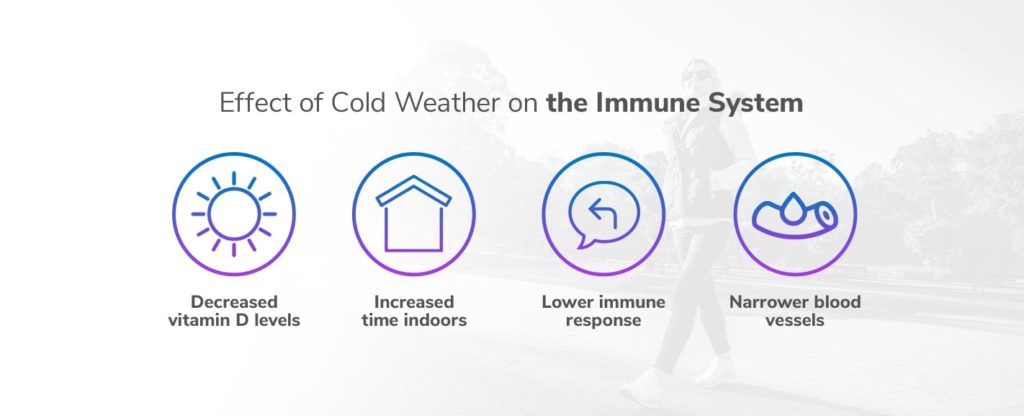According to the Centers for Disease Control and Prevention, millions of people come down with the common cold each year in the United States. The average adult can get up to three colds per year. However, your immune system is your first line of defense for braving cold and flu season. By strengthening your immune system, you’ll be ready to fight back against colds and the flu all winter long.
If you want to learn more about why cold weather brings more sickness and how to prevent a cold and boost your immune system, keep reading. We’ll give you all the tips you need to stay safe and healthy this winter.
Why Do We Get Sick in the Winter?
While cold weather itself doesn’t cause a cold or the flu — that’s a virus’ job — exposure to cold weather can increase your risk of falling ill. Essentially, your chances of getting sick in the winter go up because colder temperatures enable viruses to survive and reproduce more effectively and reduce your body’s immune response, making it more challenging to fight off germs.
Discover the details of how cold weather impacts viruses and your immune system below.
Cold Weather’s Effect on Viruses
Research has shown that the rhinovirus — the virus associated with the common cold — may replicate more efficiently in temperatures lower than 98.6 degrees Fahrenheit, which is the average internal body temperature for humans. This research suggests that rhinovirus is far more active in the winter, and environmental factors may play a role in a person’s risk of developing a rhinovirus infection.
One study, in particular, found that a decrease in temperature and humidity over three days led to an increased risk of rhinovirus infection in the study’s participants. The study also discovered that most rhinovirus infections occurred in below-freezing temperatures, another indicator that cold weather may increase rhinovirus activity.
Along with the cold-causing virus, research has found that influenza viruses, which cause the flu, may survive and spread more readily in colder temperatures and dry air. Specifically, one study found that the perfect temperature and conditions for the influenza virus to spread are around 41 degrees Fahrenheit with low humidity.

Effect of Cold Weather on the Immune System
While viruses thrive in colder temperatures, our immune system does not. Research has shown that exposure to cold weather can adversely affect a person’s immune response, making it harder for their body to fend off an infection.
Here are the main ways cold weather makes your immune system’s job more challenging.
- Decreased vitamin D levels: Many people naturally receive less vitamin D during the winter months due to less sun exposure. Lower vitamin D levels can take a toll on our ability to fight off viruses because vitamin D is essential for maintaining the immune system.
- Increased time indoors: Most people spend more time indoors once the weather gets cold. Having more people packed inside gives viruses a chance to spread from person to person more quickly.
- Lower immune response: One animal study found that exposing airway cells to colder temperatures inhibited the cells’ immune response against a type of rhinovirus.
- Narrower blood vessels: Inhaling cold and dry air makes the blood vessels of the upper respiratory tract constrict to conserve the body’s heat. Narrower blood vessels may prevent white blood cells from getting to the mucous membrane, making it more difficult for the body to defend itself against germs.
How to Prevent a Cold
Thankfully, there are plenty of ways to protect yourself from getting sick as the weather gets colder. Take the following steps to minimize your chance of catching a cold this winter.
- Wash your hands: Frequently wash your hands with soap and water, especially after using the bathroom, before handling food or after interacting with someone who’s sick.
- Cough and sneeze carefully: Always try to cough or sneeze into a clean tissue. If no tissues are available, cough or sneeze into one of your elbows instead of your hands.
- Clean regularly: Use disinfectants on your cellphone, computer keyboard, remotes, bathroom surfaces, light switches, faucets and kitchen countertops to keep them clean and safe.
- Avoid sharing items: Don’t share your food, beverages, utensils or other personal objects with others, especially if they have a cold or the flu.
- Get a flu shot: Getting your annual flu vaccine will strengthen your resistance against the virus.
- Try not to touch your face: Because viruses enter your body through your nose and mouth, you can limit your chances of getting sick by not touching your face.
Boosting Your Immune System
In addition to the list above, one of the best steps you can take to guard against getting sick this winter is boosting your immune system. Having a healthy immune system will give you an advantage against germs this winter and help you fight off sickness. In general, choosing a healthy lifestyle and following these guidelines will naturally keep your immune system protected and working correctly.
Take these steps to ensure your immune system is in top shape for cold and flu season.
- Replenish vitamin D supplies: Make up for soaking up less sunlight by taking vitamin D supplements or eating foods high in vitamin D, such as eggs, mushrooms and fatty fish.
- Prioritize healthy eating: Along with vitamin D, your immune system needs other essential nutrients to stay healthy. Get the vitamins and minerals you need by eating a diet high in fresh fruits and vegetables. Following a healthy diet will also help you maintain a healthy weight, which is crucial for a robust immune system.
- Drink water: Staying hydrated will provide your immune system with enough fluids to function at its best.
- Receive IV therapy: Intravenous therapy can deliver vital fluids and nutrients directly to your bloodstream to ensure your immune system has all the ingredients it needs to perform well. Specifically, an immune-boosting IV package will be full of the B vitamins, vitamin C and zinc that your immune system needs.
- Get plenty of sleep: Give your body the rest it needs to actively fend off viruses and recover.
- Don’t smoke: Smoking harms your lungs and places unnecessary stress on the immune system. Also, only drink alcohol in moderation.

Fortify Your Immune System With IV Therapy From Mobile IV Medics
If you want to strengthen your immune system with IV therapy, schedule an appointment with Mobile IV Medics today. We offer an immune IV package that contains a combination of vitamins and minerals specially curated for your immune system’s well-being. Along with hydrating IV fluid, our immune IV package provides infection fighters like vitamin C and B12 and anti-inflammatory molecules like glutathione.
We also offer a cold and flu IV drip package to help you recover quickly if you do end up getting sick. Our registered nurses will come directly to your door, so you don’t have to leave the house when you’re feeling achy. Book your Mobile IV Medics appointment now and we’ll be there within the hour.
Sources:
- https://www.cdc.gov/features/rhinoviruses/index.html
- https://www.ncbi.nlm.nih.gov/pmc/articles/PMC3553670/
- https://www.ncbi.nlm.nih.gov/pmc/articles/PMC5035958/
- https://jvi.asm.org/content/88/14/7692
- https://www.ncbi.nlm.nih.gov/pmc/articles/PMC3166406/
- https://www.ncbi.nlm.nih.gov/pmc/articles/PMC4311828/





